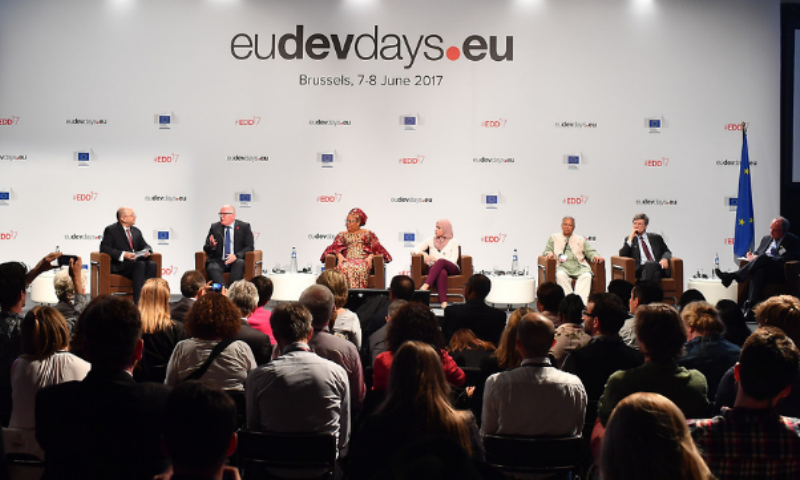
On June 7 at the European Development Days in Brussels, a number of the SDG Advocates participated in an emotive and thought-provoking panel on “What transformative changes are needed to fulfil the 2030 Agenda’s promise to leave no one behind?”. The participants gave inspiring presentations, prompted in particular by challenging and perceptive questions from three EDD Young Leaders, Farahnaz Ghodsinia, Esenam Amuzu, and Tasneem Ava. The Young Leaders were a poignant reminder that anyone, of any age, in any circumstance, can contribute in their own way to achieving the SDGs.
‘Investment in development means, first of all, investment in people,’ declared Her Majesty Mathilde, the Queen of the Belgians, in her opening address. Insisting that quality education and health are the cornerstones of an inclusive sustainable development, she warned that without sufficient efforts now there could be a terrible price to pay later, insisting that without a focus on vulnerable groups who cannot find their way to a school or a doctor, all progress will be precarious. She spoke movingly of meeting children fleeing war zones and concluded by giving heartfelt thanks to those working in the field with refugees.
European Commission Vice-President Frans Timmermans noted that ‘even in the richest societies on earth, people have the feeling they are being left behind’. In any society, he explained, the social contract assumes no one is left behind, but the reality is different, undermining solidarity towards others and the global solidarity so urgently needed to achieve the Sustainable Development Goals. ‘But we can fix it,’ he insisted. ‘It’s the eternal political problem of redistribution.’
The 2011 Nobel Peace Laureate Leymah Gbowee underlined the importance of translating the goals into a language people can understand, bringing it down to the level of a village and expressing it in the simplest terms: ‘Every child must have something to eat every day.’ Only in that way would people own the agenda and see their future in it.
Alaa Murabit, The Voice of Libyan Women, echoed the need for translation of the SDGs into people’s personal lives and demonstration that they are of interest to companies and governments through clarification of what the outcome will look like. She also insisted on the importance of educating girls about women’s reproductive rights and the need for patience as global crises interrupt progress.
Muhammad Yunus, the 2006 Nobel Peace Prize Laureate, argued that a system based on personal interest means that people are inevitably left behind. He called for a shift away from selfishness and towards selflessness in a thorough redesign of today’s economic machine that sucks resources to the top by exchanging the employer/employee model with that of the entrepreneur.
‘Inequality is an inadequate word for just eight people having more wealth than the bottom 40 % and next year it will be less than eight. It’s a ticking time bomb and will explode sooner or later,’ he warned.
‘It is the money, frankly,’ declared Jeffrey Sachs of Columbia University. ‘No miracles are needed. One per cent of world output is over a trillion dollars, enough to solve all the problems if we direct it towards vulnerable people.’ Only US$80 to US$100 are necessary per year to provide basic healthcare for a person, but that is beyond the means of country with US$800 per capita GDP.
Unilever CEO Paul Polman stated: ‘There are more good people than bad people in the world.’ Framing the issue of achieving dignity and respect for all individuals as a question of ethics, he underlined that though values are simple they are difficult to put into practice. However, the golden rule helps people assess their position: ‘If we don't want things to happen to us, why accept that it happens to others?’
Noting the damage done to the planet in the past 50 years, he called for more awareness of inter-generational responsibility, insisting that everything we do has to make sense seven generations down the line. The current system can work, Polman insisted, but there is an urgent need for courageous leadership, greater transparency to restore the trust that is the basis of prosperity, longer-term incentives in the financial markets and a broadening of the definition of capitalism to include social and environmental aspects.
Source: European Commission (EU)
Learn more about the Sustainable Development Goals Advocates.
 Welcome to the United Nations
Welcome to the United Nations